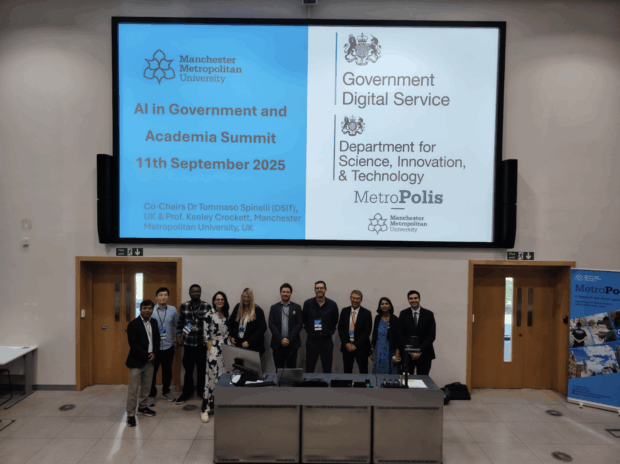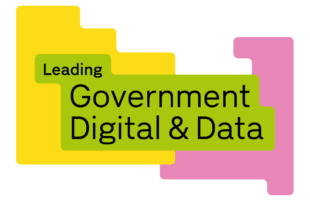
Artificial intelligence (AI) is transforming how we live, work, and deliver public services. The UK government is committed to ensuring this transformation is responsible, effective, and beneficial to society. Last week, we took another important step with the first AI in Government and Academia Summit.
Co-hosted by the Government Digital Service (GDS), part of the Department for Science, Innovation and Technology (DSIT), and MetroPolis, the policy think tank of Manchester Metropolitan University (Manchester Met), as part of Dr Spinelli’s Chancellor’s Visiting Fellowship in AI, the event brought together around 300 public servants, technologists, and researchers from across UK universities.
The summit marked the third in-person event of the AI community for the UK government, which has grown to over 4,500 members across 340 public sector organisations in the past year. The summit was inspired by the AI Opportunities Action Plan to showcase how collaboration between government and academia can translate cutting-edge research into practical tools, guidance, and services for the public good.
Building momentum together
Collaboration between government and academia is at the heart of the AI Opportunities Action Plan, which sets out a bold agenda to use AI to modernise service delivery in the UK by achieving more with less and stimulating economic growth. To enable this change, government is encouraged to establish partnerships with world-leading academics and entrepreneurs to build long-term capability, attract talent, and ensure the UK remains at the forefront of safe and ethical AI.
This approach is already delivering results. The AI Playbook for the UK government, developed by GDS in collaboration with universities, industry, and local councils, provides government departments and public sector organisations with up-to-date, high-quality guidance on a wide range of AI technologies, enabling their responsible use in the public sector.
Collaboration with academia has also enabled GDS to launch the AI Insights series by offering digital and data professionals explainers on the technical aspects of AI implementation in government. Published bimonthly, these articles are written by government technologists and peer-reviewed by academics from UK universities to ensure they reflect the latest research developments. Each of these initiatives demonstrates the value of pooling expertise across sectors.
By bringing together senior government officials and university professors, the summit provided a space to explore the potential and challenges of this collaboration and to understand how academic research developed in the UK can make a real impact on the lives of the people we serve.
Highlights from the Summit

Co-chaired by Dr Tommaso Spinelli, AI Senior Change Manager for the UK government and Research Fellow in AI, and Prof. Keeley Crockett from Manchester Metropolitan University, the day featured a rich agenda including a mix of keynote addresses by senior government officials and academic experts, a panel discussion, and the presentation of peer-reviewed research papers covering various aspects of AI technology and theory.
Professor Darren Dancey of Manchester Metropolitan University opened the event by outlining how the university has embedded ethical AI into its teaching, including a new Embedded AI Framework launching in 2026. This framework will integrate AI into disciplines such as fashion, biomedicine, and geography, while Manchester Met’s Centre for Digital Data Research (CDDR) is already applying advanced technologies and big data to challenges ranging from climate change to public health in order to demonstrate the value of multidisciplinary collaboration.
Professor Tom Crick MBE, Chief Scientific Adviser at the Department for Culture, Media and Sport (DCMS) and Professor of Digital Policy at Swansea University, offered a strategic government perspective on the future of AI. He emphasised the need to consider the human, societal, and cultural dimensions of digital transformation, not just the technical ones.
Dr Ed Steele, IT Fellow at the Met Office and Gov.uk, provided an overview of how AI and machine learning are being practically applied to enhance environmental intelligence. His talk highlighted improvements in weather prediction accuracy, alongside ongoing experimentation with new technologies and models to reduce costs and boost efficiency.
Dr Antonio Cordella, Associate Professor at the London School of Economics, delivered a thought-provoking deep dive into the implicit values embedded in technology. He illustrated how algorithms, system designs, and architectures are never value-neutral, but instead carry assumptions and choices that must be aligned with an organisation’s ethics and strategic agenda.
The final keynote, delivered by Professor Keeley Crockett of Manchester Met, offered a forward-looking reflection on the day’s insights, centred on the theme of ‘People Powered AI’. Building on Manchester’s internationally recognised People’s Panel for AI initiative, and the PEAs in PODs project, Professor Crockett demonstrated practical ways to engage communities in shaping AI technologies. The Peoples Panel for AI, led by Manchester’s Digital Strategy team in partnership with Manchester Met, promotes inclusive consultation and digital equity by serving as a replicable model for the wider public sector to ensure that new technologies are developed with community needs and values at their core.
The panel discussion, ‘Forging the Future: Cross-Sector AI Collaboration for Public Good’, emphasised the importance of public trust, the human impact of digital change, and the infrastructural barriers that still exist.
Showcasing research with impact
The conference also provided a platform for new research, with submitted papers presented across three streams: AI theory, case studies, and practical projects in local councils.
These fascinating topics included:
- using large language models to transform open data searches
- using AI tools supporting local authorities with temporary accommodation
- real-time translation for council services
- AI methods for transparent public reporting
The diversity of perspectives presented by these contributors reflected the shared challenges and opportunities across public service delivery. We’re working to make these research papers publicly available.
Looking ahead
By bringing together public servants, researchers, and technologists, the summit created a space to forge new ideas and strengthen existing ties.
The focus on showcasing real-world projects and peer-reviewed research highlighted how the UK is moving from talking about the potential of AI to actively delivering on it. Our AI community believes that collaboration between academia and government remains essential for building long-term AI capability, attracting global talent, and translating cutting-edge research into real-world impact in safe and responsible ways.
We look forward to seeing the new partnerships and projects that will emerge from this conference.
If you want to get involved, join the AI Community of Practice to connect with people across government, attend monthly meet-ups, and stay updated with newsletters.
If you’re a civil servant, you can also enrol in our free e-learning courses on Civil Service Learning to gain practical skills in safe and effective AI use.
Finally, the One Big Thing initiative later this year will have all civil servants taking part in AI training.

Leave a comment